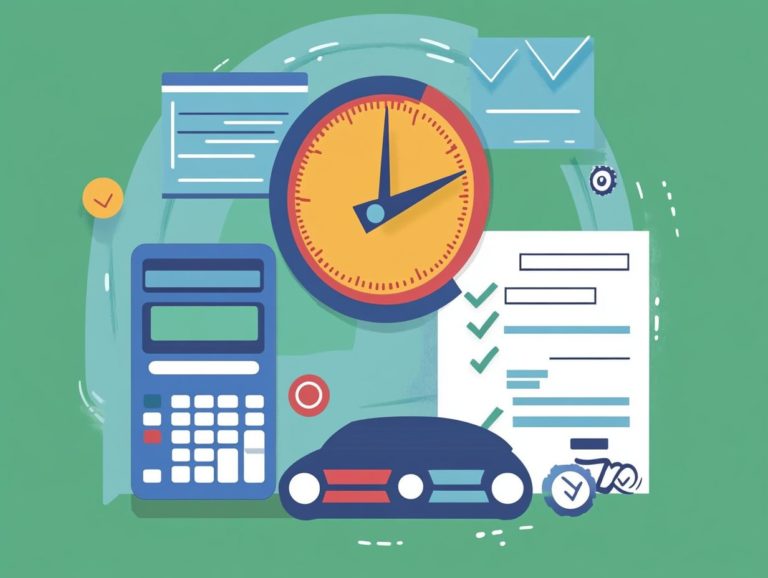5 Car Financing Tips for College Students
Navigating the realm of car financing may seem overwhelming for college students, but it doesn t have to be a source of stress.
Equipped with the right knowledge and strategies, you can secure a vehicle that perfectly aligns with your needs and budget. From establishing a realistic budget to exploring various financing options, this guide gives you the crucial tools to make smart financial choices and secure your dream car today!
It also highlights common pitfalls to steer clear of, outlines the types of loans available, and explains how financing a car can contribute to building your credit. Whether you re contemplating a new or used car, this guide empowers you with the tools necessary for making a sound financial decision.
Contents
- Key Takeaways:
- 1. Determine Your Budget and Stick to It
- 2. Research Different Financing Options
- 3. Consider Used Cars
- 4. Get Pre-Approved for a Loan
- 5. Negotiate for a Better Deal
- What Are the Benefits of Financing a Car as a College Student?
- What Are the Common Mistakes to Avoid When Financing a Car as a College Student?
- Types of Car Loans for College Students
- How Can a College Student Build Credit While Financing a Car?
- What Are the Long-Term Effects of Financing a Car as a College Student?
- What Are Some Tips for Maintaining a Car While in College?
- Frequently Asked Questions
- What are the best financing options for college students looking to buy a car?
- How can college students improve their chances of getting approved for a car loan?
- What are some common mistakes that college students make when financing a car?
- Is it better to finance a car through a dealership or a bank?
- Can I refinance my car loan as a college student?
- What are some tips for managing car loan payments as a college student?
Key Takeaways:

- Determine your budget and stick to it. Don’t overspend on a car and end up in debt. Consider all expenses, including insurance and maintenance.
- Research different financing options, such as loans and leasing, to find the best fit for your financial situation. Compare interest rates and terms carefully.
- Consider buying a used car instead of a new one. It can save you money and still provide reliable transportation. Have a mechanic inspect the car before purchasing.
1. Determine Your Budget and Stick to It
Determining your budget is a vital first step in the car-buying journey, especially when you re a college student navigating the complexities of tuition fees, student loans, and living expenses.
It s crucial to factor in all related costs think parking, maintenance, and insurance into your financial planning.
As you set a realistic budget, don t just focus on the monthly payments and the total purchase price. You ll want to consider additional expenses like fuel costs, registration fees, and potential repairs.
It s also wise to keep in mind that insurance premiums can vary based on the type of vehicle you choose. By taking this comprehensive approach, you ll keep your financial constraints in check and avoid any unwelcome surprises in the future.
Sticking to this budget during your vehicle shopping process not only lightens the financial load but also instills confidence in your decision-making, ensuring that the long-term ownership costs remain manageable.
2. Research Different Financing Options
Exploring various financing options is crucial for college students aiming to secure the best terms for their car loans. This includes considering traditional credit unions, online lenders, and 5 strategies for effective car loan management offered by financial institutions.
Understanding co-signer benefits can significantly boost your loan eligibility. Having someone with good credit co-sign your loan can help you get better rates, making your application more appealing.
Alternative loans also present a viable option for those with limited credit histories, often featuring more flexible terms tailored specifically for students. Many banks have specialized programs designed to address the unique financial challenges you may encounter during your college years.
Prequalification for loans is essential; it allows you to assess your borrowing potential without impacting your credit score. Gaining deeper insight into your credit history can lead to more favorable loan approvals, ultimately alleviating the financial burden both during and after your academic journey.
3. Consider Used Cars
When budgeting for a student car, considering used vehicles can be a wise financial move. They usually come with lower purchase prices, reduced monthly payments, and cheaper insurance costs, making them accessible even for those navigating college life on a tight budget.
Purchasing a used vehicle typically means you ll face lower depreciation rates compared to new cars, allowing you to retain more of your investment over time.
Plus, the availability of vehicle history reports offers added reassurance, giving you insights into past ownership, repairs, and any potential issues.
Compact sedans are often favored for their affordability and fuel efficiency, while SUVs bring that extra space for friends or gear, adding a layer of versatility to your campus lifestyle.
The opportunity to negotiate better deals can lead to significant savings, especially if thorough inspections show that the vehicle’s maintenance and repair costs are manageable, minimizing long-term financial strain.
4. Get Pre-Approved for a Loan

Securing pre-approval for an auto loan not only simplifies the car-buying journey for you as a college student but also gives you a clear picture of the loan amount, interest rates, and monthly payments. To help you choose the best options, consider checking out the top 5 auto financing companies. Just keep in mind that a solid credit history or a co-signer—someone who agrees to take responsibility for the loan if you cannot—can really strengthen your application.
To make this process easier, start by gathering essential documents: proof of income, identification, and details about any existing debts.
Evaluating your credit history is key; understanding your credit score allows you to tackle any potential issues before you hit that apply button. Bringing a co-signer with a robust credit profile on board can make it easier to get approved for a loan. This not only boosts your application but also enhances your chances of landing more favorable financing terms, leading to a more seamless and cost-effective car purchasing experience.
5. Negotiate for a Better Deal
Negotiating for a better deal is an essential skill for you as a college student shopping for a vehicle. Mastering this skill can have a significant impact on the purchase price, enabling you to save money that can be redirected toward other financial decisions like insurance and maintenance costs.
By honing your negotiation tactics, you can position yourself advantageously during the purchasing process. Researching the vehicle’s market value enables you to make informed offers instead of simply succumbing to dealer pricing. Understanding various financing options is crucial; this clarity allows you to tailor your choices to fit your budget, ensuring you know exactly what to expect in terms of monthly payments and interest rates.
Knowing when to walk away is equally important; often, the best decision is to decline a deal that doesn t align with your financial needs. Leveraging competition among dealers can further enhance your strategy, prompting sellers to present better prices. You can also consider leasing offers, which provide an alternative route for managing costs while keeping your options open for future negotiations.
Start honing your negotiation skills now, and watch the savings add up!
What Are the Benefits of Financing a Car as a College Student?
Financing a car as a college student brings a wealth of advantages. It enhances your mobility for commuting to classes, allows you to build a positive credit history, and opens the door to favorable co-signer benefits. To make the most of this opportunity, consider these smart financing moves for avoiding car debt, which can simplify the loan approval process while potentially reducing costs.
Financing a car helps you balance academic responsibilities with social engagements, creating a well-rounded college experience. Responsible borrowing helps you establish a healthy credit score, which can unlock better car financing options down the line. As you manage your payments with diligence, you set the stage for future loans with lower interest rates and improved terms critical for significant purchases like a home or further education.
By weaving vehicle financing into your broader financial strategy, you re not just investing in transportation; you re laying the groundwork for your long-term financial well-being.
What Are the Common Mistakes to Avoid When Financing a Car as a College Student?
College students often stumble into common pitfalls when financing a car. They might overlook the total cost of ownership, which includes the purchase price, insurance, maintenance, and fuel. Knowing this helps you avoid surprises. Understanding the top car financing websites can also help them avoid underestimating monthly payments and neglecting to thoroughly review their credit history before applying for auto loans, which can lead to financial strain down the road.
Along with these oversights, students frequently fail to budget for essential maintenance and insurance costs, which can significantly inflate their monthly expenses. They may also skip the vital step of loan prequalification, missing out on potential savings by not identifying the best interest rates in advance. A lack of comparison shopping for financing options often results in settling for unfavorable terms, widening the gap between their budget and reality.
To navigate these challenges effectively, it s prudent to create a detailed budget that encompasses all associated costs, conduct thorough research on loan options, and seek guidance from financial advisors whenever necessary.
Types of Car Loans for College Students

Understanding the car loans available to college students helps you make informed financial choices. Options range from traditional auto loans from credit unions to flexible financing from online lenders designed specifically for students, including ways to finance a car with bad credit.
These include secured loans and unsecured loans. Secured loans often have lower interest rates but require collateral, while unsecured loans offer flexibility at usually higher rates.
Many lenders offer student-friendly programs with lower qualification criteria and unique incentives. Using a co-signer can improve your chances of approval and potentially get you better rates.
By evaluating these factors, you can navigate your choices effectively, balancing manageable monthly payments with your long-term financial health.
How Can a College Student Build Credit While Financing a Car?
Financing a car can be a smart choice for you as a college student looking to build your credit history. To make informed decisions, consider these must-read tips for new car buyers. Making timely monthly payments on auto loans can positively impact your credit score, paving the way for future financial opportunities.
Beyond boosting your credit score, establishing consistent payment habits lays a solid foundation for long-term financial stability. By sticking to a budget and ensuring your bills are paid on time, you can sidestep late fees and avoid those pesky credit score dips.
Keeping an eye on your credit history is essential. Explore free credit report services to monitor your progress effectively.
Using credit wisely not only enhances your financial profile but also teaches invaluable lessons about debt management and fiscal responsibility.
What Are the Long-Term Effects of Financing a Car as a College Student?
The long-term effects of financing a car as a college student can profoundly impact your financial landscape. This includes the potential for an improved credit history and the challenge of managing ongoing insurance costs, but there are also ways to save on your car loan interest.
It s important to understand how the initial thrill of purchasing a vehicle can evolve into a long-term financial commitment. For many, the combined weight of monthly car payments alongside student loans creates a delicate balancing act.
To navigate these challenges effectively, prioritize maintaining a solid credit score and budget wisely to accommodate unexpected expenses.
Establishing a clear financial strategy can help mitigate the risks associated with car financing, especially for those seeking tips for first-time new car buyers, ensuring that you thrive rather than merely survive in your post-college years.
What Are Some Tips for Maintaining a Car While in College?
Maintaining a car while in college requires a proactive mindset. This helps keep repair costs low, manage insurance expenses, and navigate parking fees.
Consider scheduling regular check-ups for your vehicle. This allows you to catch small issues before they escalate into costly repairs, extending your car s lifespan.
Understanding local parking regulations is crucial to avoid fines that can quickly accumulate. Balancing vehicle usage with financial responsibilities may require you to prioritize your needs.
Ensure you allocate your funds efficiently while still enjoying the convenience of a dependable car.
Frequently Asked Questions

What are the best financing options for college students looking to buy a car?
1. Student car loans: Many banks and credit unions offer special programs for college students.
2. Co-signer: A family member or friend with good credit can help you by co-signing your loan.
3. Personal loan: Consider a personal loan from a bank or online lender to finance your car.
4. Lease: Leasing might give you lower monthly payments if you’re on a tight budget.
5. Used car: Choosing a used car can save you money on financing and insurance.
How can college students improve their chances of getting approved for a car loan?
1. Build a good credit score: Pay your bills on time and keep credit card balances low for a better score.
2. Get a part-time job: Having steady income shows lenders you can make payments.
3. Save for a down payment: A larger down payment can lower monthly payments and show financial responsibility.
4. Have a co-signer: A co-signer with good credit can boost your approval chances.
5. Shop around: Always compare loan offers for better rates and terms.
What are some common mistakes that college students make when financing a car?
1. Not considering all costs: Many focus only on monthly payments, ignoring insurance and maintenance costs.
2. Choosing a car solely based on looks: Don t let a flashy car lure you into poor financial choices.
3. Not reading the fine print: Carefully read loan terms before signing any contracts.
4. Not negotiating: You can ask for better rates or lower payments; the worst they can say is no!
5. Ignoring long-term impacts: Consider how a car loan will affect your future financial goals.
Is it better to finance a car through a dealership or a bank?
This depends on your situation. Dealerships may be convenient but often have higher rates. Banks or credit unions may take longer but could offer better rates. Compare both options to find what fits your needs.
Can I refinance my car loan as a college student?
Yes, refinancing is possible! If your credit score has improved or interest rates have dropped, it could save you money on interest. Just remember, refinancing might extend your loan term, so weigh the long-term effects.
What are some tips for managing car loan payments as a college student?
1. Stick to a budget: Include loan payments in your monthly budget to avoid missing them.
2. Automate payments: Set up automatic payments to stay on track.
3. Cut costs elsewhere: Find ways to reduce other expenses to free up cash for payments.
4. Communicate with your lender: If you’re struggling, reach out to your lender for options.
5. Consider downsizing: If payments are too high, think about getting a more affordable car.






